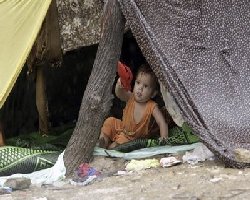Landslides have cut off large portions of Pakistan's Swat Valley and hampered efforts to help the 15 million people affected by Pakistan's worst flooding in decades.
Many roads and bridges have been washed away by the floodwaters, and heavy rains prevented helicopters from taking off.
Nine people were confirmed dead on Sunday in the northwestern Khyber Pakhtunkhwa province, and 28 bodies were recovered from collapsed houses in Gilgit-Baltistan province, where landslides have crushed dozens of houses. The UN estimates more than 1,600 people have been killed nationwide.
"Millions of people have suffered, and still there is more rain, and further losses are feared," said Yousuf Raza Gilani, the Pakistani prime minister, on a visit to Sindh province on Sunday. "I appeal to the world to help us. We are doing what we can."
"The government has done everything possible, but it is beyond our capacity, we are facing an extremely difficult situation," he said.
Residents in Swat have complained of worsening food and fuel shortages as the crisis drags on.
"There is no petrol in the pumps and no food in the shops. The government is doing nothing for us," said Malik Amir Zada, a Swat resident, in a telephone interview with the AFP news agency.
Floodwaters moving south
Rescue workers have rushed to evacuate thousands of families from the southern part of Sindh province, where floodwaters could burst the banks of the Indus river.
Food prices are expected to rise as the waters continue to swamp agricultural areas. Pakistan's Express-Tribune newspaper reported "skyrocketing" fruit and vegetable prices on Sunday.
"Floods and rains have made these things unaffordable," one shopper in Lahore told the newspaper.
Millions of acres of crops have been destroyed in Punjab province, often called the "rice bowl" of Pakistan, and across the northwest.
The flooding has also caused extensive damage to Pakistan's electrical infrastructure, forcing power plants to shut down across the country. Pakistan already suffers from a crippling electricity crisis, with hours-long blackouts a daily occurrence.
More than 252,000 homes have been damaged or destroyed across Pakistan, according to the government.
Pakistan's military said over the weekend that it has rescued more than 100,000 people from flooded areas.
'Zardari's Katrina'
Asif Ali Zardari, the unpopular Pakistani president, is expected to return to the country on Monday or Tuesday after a visit to France and the United Kingdom.
The trip - at the height of the disaster - was criticized by many Pakistanis, who accused Zardari of mismanaging the crisis.
Zardari's estranged niece, Fatima Bhutto, called the flooding "Zardari's Katrina", a reference to former US president George Bush's handling of Hurricane Katrina in 2005.
Many villagers have complained about a lack of basic services in relief camps established by the government and the Pakistani army.
PHOTO CAPTION
A child affected by floods sits in make-shift tent in Nowdhera, Pakistan on Sunday, Aug. 8, 2010.
Al-Jazeera


 Home
Home Discover Islam
Discover Islam Quran Recitations
Quran Recitations Lectures
Lectures
 Fatwa
Fatwa Articles
Articles Fiqh
Fiqh E-Books
E-Books Boys & Girls
Boys & Girls  Ramadan
Ramadan Fatwa Audios
Fatwa Audios Month of Mercy
Month of Mercy Women
Women Eed Al- Fitr
Eed Al- Fitr Food Recipes
Food Recipes Videos
Videos

 Prayer Times
Prayer Times












